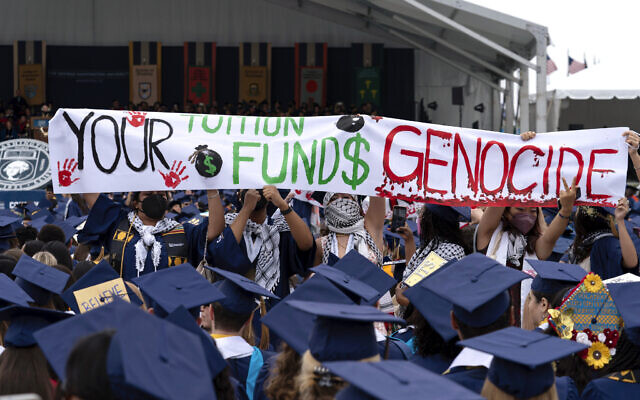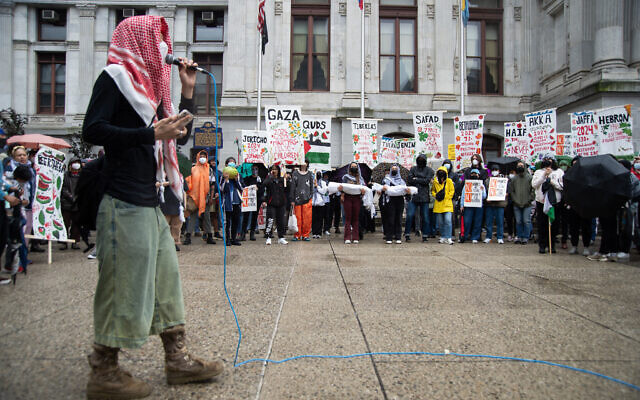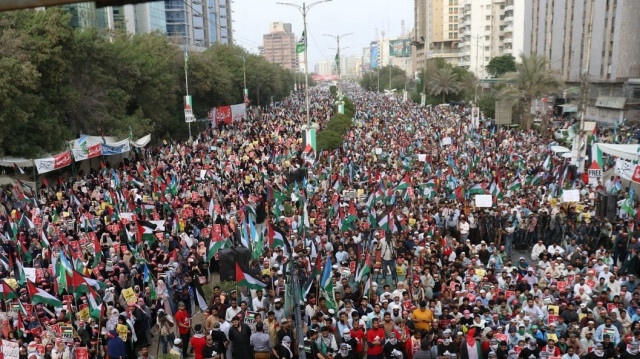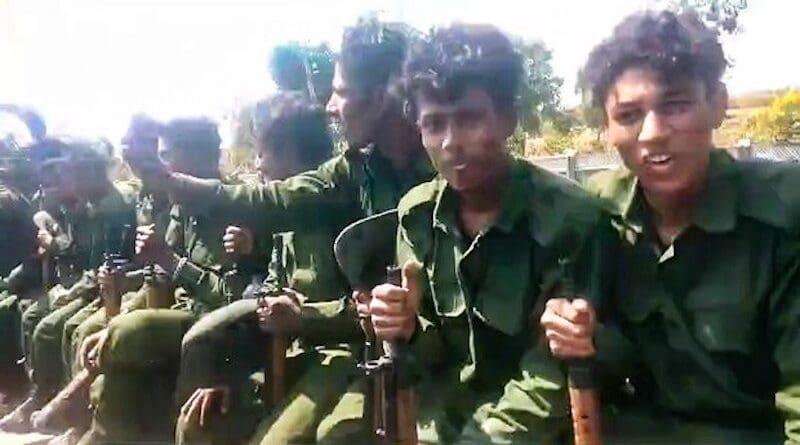Protesters heard chanting ‘there is only one solution, intifada revolution’ after leaving; students at Drexel University in Pennsylvania set up new encampment on campus
By AP and TOI STAFF

George Washington University students carry a sign during an anti-Israel protest as George Washington University President Ellen Granberg speaks at a commencement ceremony in Washington, May 19, 2024. (AP Photo/Jose Luis Magana)
Dozens of George Washington University graduates walked out of commencement ceremonies on Sunday, disrupting university President Ellen Granberg’s speech, in protest over the ongoing war in Gaza and last week’s clearing of an on-campus protest encampment that involved police use of pepper spray and dozens of arrests.
The ceremony, at the base of the Washington Monument, started peacefully with fewer than 100 protesters demonstrating across the street in front of the Museum of African American History and Culture.
But as Granberg began speaking, at least 70 students among the graduates started chanting and raising signs and Palestinian flags.
The students then noisily walked out as Granberg spoke, crossing the street to a rapturous response from the protesters.
In video shared on social media, some protesters could be heard chanting in Arabic: “From the water to the water, Palestine is Arab.” Some also chanted “there is only one solution, intifada revolution.”
The protesters could be seen holding signs reading “your tuition funds genocide,” “divest now,” and waving Palestinian flags, with many of them sporting keffiyehs. They were also joined by a small group of Neturei Karta, the fringe anti-Zionist Hassidic sect.
Meanwhile pro-Palestinian protesters set up a new encampment at Drexel University in Philadelphia over the weekend, prompting a lockdown of school buildings, a day after authorities thwarted an attempted occupation of a school building at the neighboring University of Pennsylvania campus.
After several hundred demonstrators marched from Philadelphia’s City Hall to west Philadelphia on Saturday afternoon, Drexel said in a statement that about 75 protesters began to set up an encampment on the Korman Quad on the campus. About a dozen tents remained Sunday, blocked off by barricades and monitored by police officers. No arrests were reported.
Drexel President John Fry said in a message Saturday night that the encampment “raises understandable concerns about ensuring everyone’s safety,” citing what he called “many well-documented instances of hateful speech and intimidating behavior at other campus demonstrations.” University buildings were “open only to those with clearance from Drexel’s Public Safety,” he said.
Authorities at Drexel, which has about 22,000 students, were monitoring the demonstration to ensure it was peaceful and didn’t disrupt normal operations, and that “participants and passersby will behave respectfully toward one another,” Fry said.
“We will be prepared to respond quickly to any disruptive or threatening behavior by anyone,” Fry said, vowing not to tolerate property destruction, “harassment or intimidation” of students or staff or threatening behavior of any kind, including “explicitly racist, antisemitic, or Islamophobic” speech. Anyone not part of the Drexel community would not be allowed “to trespass into our buildings and student residences,” he said.

Anti-Israel protesters march from Philadelphia City Hall to University of Drexel Campus where they set up an encampment in Philadelphia, Pennsylvania on May 18, 2024. (Matthew Hatcher / AFP)
On Friday night, members of Penn Students Against the Occupation of Palestine had announced an action at the University of Pennsylvania’s Fisher-Bennett Hall, urging supporters to bring “flags, pots, pans, noise-makers, megaphones” and other items.
The university said campus police, supported by city police, removed the demonstrators Friday night, arresting 19 people, including six University of Pennsylvania students. The university’s division of public safety said officials found “lock-picking tools and homemade metal shields,” and exit doors secured with zip ties and barbed wire, windows covered with newspaper and cardboard and entrances blocked.
Authorities said seven people arrested would face felony charges, including one accused of having assaulted an officer, while a dozen were issued citations for failing to disperse and follow police commands.
US President Joe Biden told the graduating class at Morehouse College on Sunday, which included some students wearing keffiyeh scarves around their shoulders on top of their black graduation robes, that he heard their voices of protest and that scenes from the conflict in Gaza have been heartbreaking. He said given what he called a “humanitarian crisis” there, he had called for “an immediate ceasefire” and return of hostages taken by Hamas.
On the Campuses and Around the World, a Revolution of Empathy
In a world of so much bad news, when so many trends seem to be rolling down the wrong track, it can be hard for people who care about the future to keep our heads above water. We’re drowning in it.
In the midst of all this, a light shines through, a moral awakening of the kind we are going to need to overcome all our onrushing crises. It is the revolution of empathy now taking place on college campuses, in encampments springing up across the U.S. and other countries. Students who mostly have no direct interests, no relatives in Gaza, are rising to witness the genocide in our faces, the dead, maimed, starved and brutalized people of Palestine, and to say that in any sense of human understanding, this is unacceptable and they want no part in it. They are calling on their institutions to divest from Israel and corporations that are arming Israel.
The crackdown by university administrators and police, ranging from suspensions and campus exclusions to attacks and arrests, some involving tear gas and rubber bullets, reflects how deeply the students’ actions are challenging the dominant narrative, as I wrote in my last post. For there is a war on right now. It is a war for the mind.
A couple of items to that point have been circulating on social media lately. They have drawn a lot of attention. One is comments by Palantir CEO Alex Karp, speaking recently at the Ash Carter Exchange on Innovation and National Security, a gathering of military officials and high-tech military-intelligence complex contractors such as himself.
“We kind of think these things that are happening across college campuses, like, are a sideshow. No, they are the show. If we lose the intellectual debate, you will not be able to deploy any army in the West, ever.” Palantir thought it was important enough to put the video clip up on its Twitter/X account.
Another is an exchange between Senator Mitt Romney and Secretary of State Antony Blinken at a McCain Institute event.
Romney bemoans, “Why has the PR been so awful? . . . Typically the Israelis are good at PR. What’s happened here, how have they and we been so ineffective at communicating the realities and our POV?”
Blinken responds, “We’re on an intravenous feed of information, with new inputs, new impulses, every millisecond. And, of course, the way this has played out on social media has dominated the narrative. And you have a social media ecosystem environment in which context, history, facts get lost, and the emotion, the impact of images dominates. And we can’t, we can’t discount that, but I think it also has a very, very, very challenging effect on the narrative.”
Romney comes back with “a small parenthetical point, which is why some wonder why there was such overwhelming support for us to shut down potentially TikTok or other entities of that nature. You look at the postings on TikTok and the number of mentions of Palestinians relative to other social media sites. It’s overwhelmingly so among TikTok broadcasts.”
The point doesn’t seem so “small” and “parenthetical” though, but central to the issue. Underscored by another comment by Rep. Mike Lawler (R-NY), on a No Labels Zoom call raising the cry for further crackdowns on student protesters, reported by The Intercept. “I don’t think there’s any question that there has been a coordinated effort off these college campuses, and that you have outside paid agitators and activists. It also highlights exactly why we included the TikTok bill in the foreign supplemental aid package because you’re seeing how these kids are being manipulated by certain groups or entities or countries to foment hate on their behalf and really create a hostile environment here in the U.S.”
This worst kind of McCarthyite blather evades the reality which corporate and political leaders are frantically trying to deny, that the students are expressing a real empathy for the other, in this case the Palestinians. One wonders if the likes of Karp, Romney, Blinken and Lawler even understand the concept of empathy, having clawed their way up through business and political power structures that reward the most sociopathic of instincts. It is the narrative they seem almost incapable of comprehending.
To understand the revolution of empathy the students are expressing, one has to look at what they are saying, and what they are suffering, as this excellent piece by Chris Hedges illustrates, aptly describing them as “The Nation’s Conscience.” (Hedges himself has suffered the cancellation of his show on The Real News Network, no doubt because of the critical stance he has been taking on the Biden Administration’s response to the Gaza genocide.)
Hedges recounts sitting on a fire escape across from Columbia University with three student organizers of the protests. One was Sara Wexler, a Jewish doctoral student of philosophy. Understanding the Jewish desire for a safe place after all the horrors Jews have suffered, she reflects the way many Jewish people are seeing beyond a narrow “Israelism” to the interests of all people.
Hedges quotes her, “I’m a German-Polish Jew. My last name is Wexler. It’s Yiddish for money-maker, money-exchanger. No matter how many times I tell people I’m Jewish, I’m still labeled antisemitic. It’s infuriating. We are told that we need a state that is based on ethnicity in the 21st century and that’s the only way Jewish people can be safe. But it is really for Britain and America and other imperialist states to have a presence in the Middle East. I’ve no idea why people still believe this narrative. It makes no sense to have a place for Jewish people that requires other people to suffer and die.”
Another powerful Jewish voice raised in protest is Amos Goldberg. As Professor of Holocaust Studies at The Hebrew University of Jerusalem, the context and history to which Antony Blinken refers are not lost on him. He knows what he is seeing.
“Yes, it is genocide,” Goldberg writes. “Although it is so difficult and painful to admit this and despite all efforts to think otherwise, at the end of six months of a brutal war it is no longer possible to escape this conclusion. Jewish history will henceforth be stained with the mark of Cain of the ‘crime of crimes,’ which cannot be erased from its forehead. As such, it will stand trial for generations.
“What is happening in Gaza is genocide because the level and pace of the indiscriminate killing, the destruction, the mass deportations, the displacement, the starvation, the executions, the elimination of cultural and religious institutions, the crushing of the elites (including the killing of journalists), and the sweeping dehumanization of the Palestinians – create an overall picture of genocide, of intentional and conscious crushing of the Palestinian existence in Gaza.
“In many ways, Palestinian Gaza as a geographical-political-cultural-human complex no longer exists. Genocide is the deliberate destruction of a collective or part of it – not all of its individuals. And this is what is happening in Gaza. The result is undoubtedly genocidal.”
Will the voices raised by students and others taking to the streets around the world have an effect? Biden recently announced he is suspending shipments of the largest bombs, 2,000- and 2,500-pound monsters capable of taking out a whole city block, if Israel conducts a major attack on Rafah, to which the Gazan population has been driven. It is almost impossible to see Biden having made such an announcement if the protests had not placed him under severe pressure. But it seems to be mostly window dressing, a game of narrative management, of image control, while Israel continues its genocidal assault unabated.
The day after Biden’s announcement, Israeli Defense Forces spokesman Daniel Hagari responded “The IDF has armaments for the missions it is planning, including missions in Rafah. We have what we need.” U.S. officials confirmed this, as does the pummeling now taking place. Reports of an intensification of bombing in Rafah are coming in. This last so-called refuge is being brutally pounded by the Israeli military.
What can people do against this beyond standing in witness to oppose what we see unfolding? There is a point to stand up for what you know is right whether or not you have a hope of victory. Abolitionists long stood up for ending slavery, and were a minority even at the beginning of the U.S. Civil War. Opponents of the Vietnam War were a minority until very late in the conflict. Neither could abide with blatant evil, so they did what was necessary to keep their own integrity as human beings. Though with people being murdered and maimed every day, it is hard to see this as anything close to enough.
But the students and other people rising against this genocide are doing the difficult and painful work that makes a way for broad social awakening. They are rebelling against the contradictions in which we live, drawing attention to the evils in which we are collectively enmeshed, engaging in a struggle both inner and outer, to say we must live in empathy and peaceful coexistence with the other. It is the task needed to grapple with the many injustices of our world. To make a revolution of empathy, the only way we will ever win the world we want, and need.
This first appeared in The Raven.




